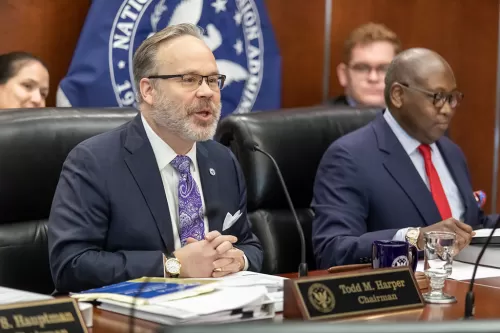NCUA Chairman Todd M. Harper during a meeting of the NCUA Board.
As Prepared for Delivery on September 21, 2023
Thank you, Naghi, Simon, and John, for your informative presentation. I also want to share my appreciation with the teams in the offices of Examination and Insurance, General Counsel, and Fintech and Access who worked on this final rule on financial innovation, loan participations, and eligible obligations. Thank you, all, for a job well done.
As our presenters noted, the final rule before us today is largely unchanged from the proposal issued last December. With this final rule, the NCUA’s regulations related to loan participations and eligible obligations will shift from a prescriptive system to a principles-based structure. Specifically, the limits previously found in the NCUA’s regulations are replaced with policy, due diligence, and risk-management requirements that a credit union can tailor to match its risk levels and activities.
With the removal of limits on the purchases of eligible obligations and greater clarity on the qualifying criteria, federal credit unions can now purchase non-member loans from other credit unions. They also have more flexibility to transact with fintech companies and other institutions that offer services associated with the origination and sale of loans made to members of federal credit unions. As such, this final rule allows credit unions to capitalize on the benefits and opportunities provided by fintech firms.
Commenters correctly noted these changes to the NCUA’s regulations can create new and additional revenue streams. They can also bring in new sources of liquidity to the credit union system. However, with greater freedom also comes greater responsibility.
Conducting appropriate due diligence on third parties is a long-standing expectation for all financial institutions, including credit unions. A credit union cannot simply accept the information and assurances provided by a vendor without first kicking the tires, reading the warranty, looking under the hood, and checking the oil.
These widely known automobile metaphors are more than just idioms. In fact, they demonstrate the importance of due diligence in the process of selecting a vendor, purchasing an obligation, or originating a new loan. Managers and boards of directors choosing to use this new rule, therefore, must ensure their third-party due diligence and vendor management policies are updated, followed, and reflect the size and complexity of their activities and risk levels.
This due diligence is especially important because the NCUA is unable to directly oversee third-party vendors. That said, this new rule codifies several long-standing supervisory guidance letters on third-party due diligence, indirect lending, and loan participations. And, these regulatory changes will make it easier for examiners to cite due diligence issues in documents of resolution during credit union exams.
Naghi, would you elaborate more on the safety and soundness provisions and guardrails contained in the final rule?
Thank you for clarifying those important risk-management and due diligence requirements. These safety and soundness provisions are helpful as these powers create new risks in areas such as consumer financial protection, Bank Secrecy Act compliance, information security, and reputation risk.
Before closing, I want to thank Board Member Hood for his leadership on this issue. This rulemaking reflects much of his vision for encouraging credit unions to harness the promise of fintech to reach new communities, foster financial inclusion, and expand opportunities for credit union growth.
Vice Chairman Hauptman also deserves mention for his support for the proposed and final rule as well as for other financial innovation-related policy changes at the NCUA. His priorities intersect with my own regulatory philosophy on advancing credit union innovation consistent with our statutory responsibilities to maintain safety and soundness and protect consumers.
Thank you again, Naghi, Simon, and John, for your hard work. This tailored final rule will provide flexibility to credit unions while fostering innovation. That concludes my comments. I now recognize Vice Chairman Hauptman.




